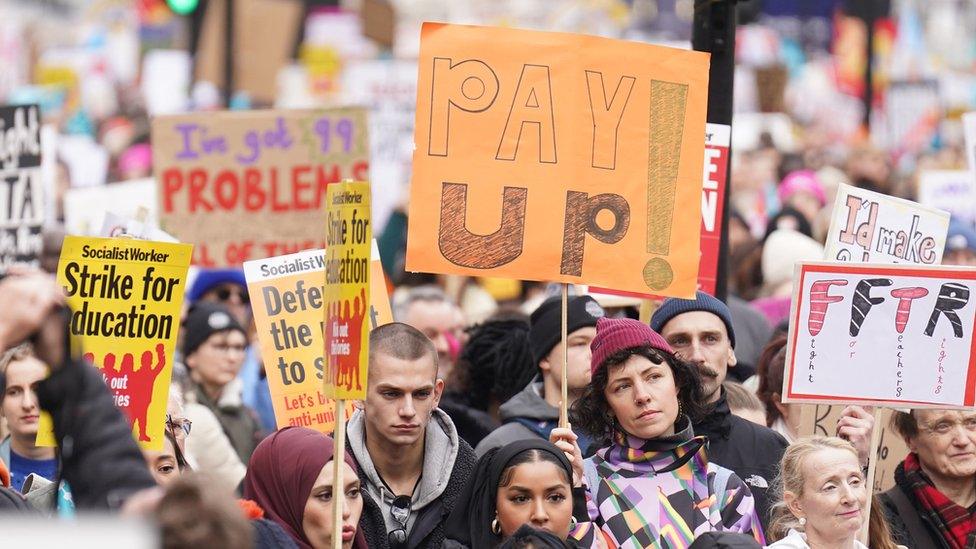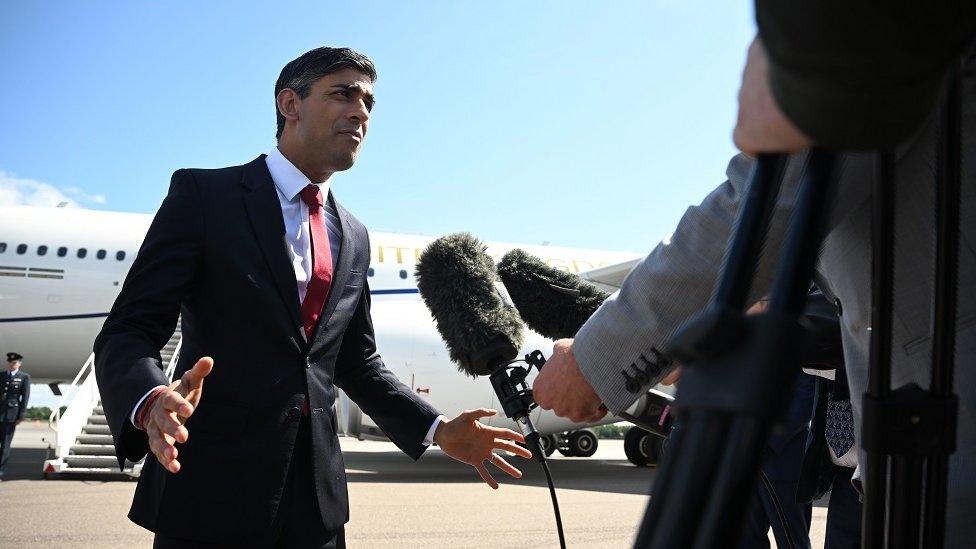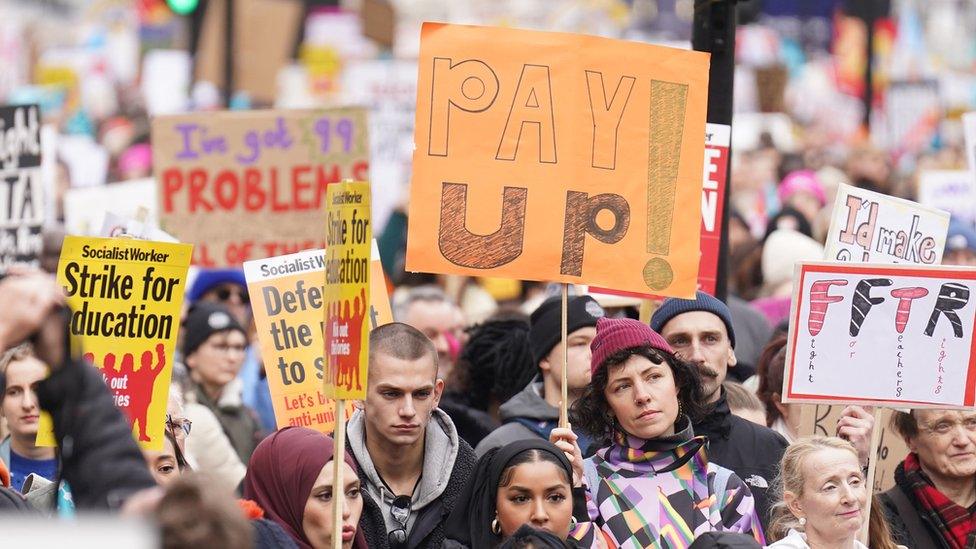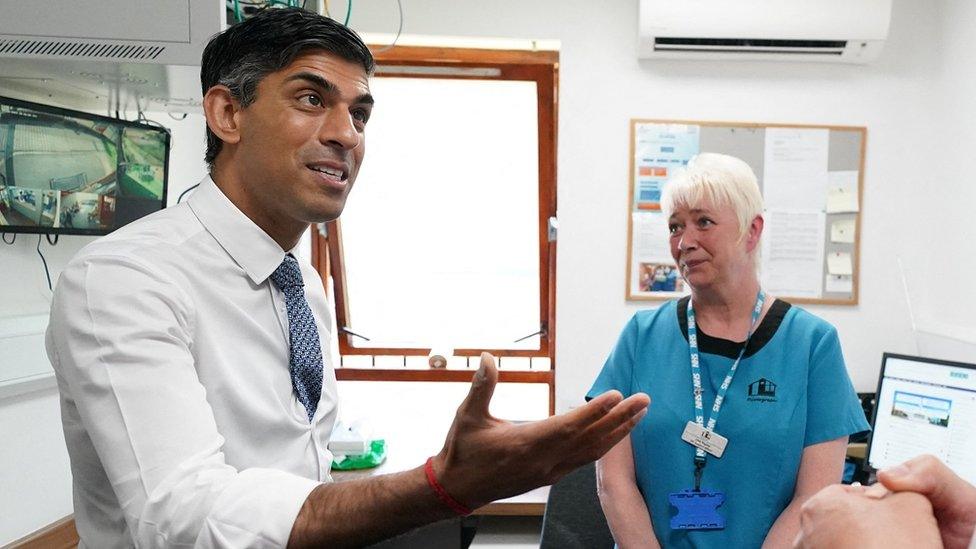Government weigh up 6.5% public sector pay increase
- Published

Hundreds of thousands of public sector workers have been taking part in strikes over pay
The government is considering pay increases of 6-6.5% for public sector workers, the BBC understands.
Official pay review bodies for employees including teachers, junior doctors and police have recommended the pay rise. Inflation to May was 8.7%.
The announcement will be made on Thursday, following formal sign off from the prime minister and chancellor.
Government sources have told the BBC any rises over 3.5% would need to come out of existing departmental budgets.
The BBC has been told that all of the independent bodies have all recommended pay rises of between 6% and 6.5% for public sector workers, also including prison officers, senior civil servants and the armed forces.
But there have been heavy hints from ministers in the past few weeks that they may not accept these recommendations, stressing their argument for wage "discipline" during a period of high inflation.
Prime Minister Rishi Sunak says pay awards should be "responsible" to avoid making inflation worse. He has made tackling rising prices his top political priority.
Departments had told pay review bodies they had budgeted for pay rises of about 3.5%.
The salaries of NHS staff in England - apart from junior doctors and dentists - are not included in these recommendations.
Under a deal set out earlier this year, NHS workers will receive a 5% pay rise. Ambulance workers, nurses, physios and porters will also get a one-off sum of at least £1,655.
It's expected the PM and Chancellor Jeremy Hunt will tell ministers any awards higher than this will have to be funded through cuts or savings elsewhere in their own departments.
A decision not to accept the recommendations would prompt fresh tensions with unions, raising the prospect of continuing public-sector strikes.
Mr Hunt ruled out funding pay rises with government borrowing during an interview on ITV1's Peston programme.
Increasing public sector pay through borrowing would "pump billions of pounds of extra money into the economy" leading to businesses "putting up their prices" and driving further inflation.
And in a speech to leading figures from finance and business at the Mansion House this week, he said: "Borrowing is itself inflationary."

The prime minister spoke to journalists ahead of a Nato summit in Lithuania
Speaking at a news conference at the Nato summit in Lithuania, Mr Sunak said his decision about pay would be guided by "fairness" to public sector workers and taxpayers, as well as "responsibility".
He said he did not want to do anything that would "fuel inflation, make it worse or last for longer".
Speaking on Monday during a visit to Avon and Somerset police force, Home Secretary Suella Braverman would not answer directly whether the government should abide by recommendations on public sector pay.
Praising police officers, she said: "They do incredibly heroic work, day in, day out, and they save lives and it's right that we properly reward them for their sacrifice and their dedication.
"We know that there's an ongoing process - it is a decision for the whole of government.
"I don't want to pre-empt that process and the conclusions of that consideration, but it's right that we properly reward frontline police officers and bear in mind that we're in a very challenging situation, economically."
Labour's deputy leader Angela Rayner declined to say whether her party would accept pay body recommendations.
She said she hadn't "seen the books" but a Labour government would do its best to negotiate a deal that was acceptable to public sector workers.
Labour's fiscal rules are “non-negotiable”, says its deputy leader, but there is "room in the middle” for pay rises.
Taxing decisions
Mr Sunak has previously pledged to halve inflation this year to about 5%, as part of his top five priorities since becoming prime minister.
The rate at which prices are rising remained unchanged at 8.7% in May, despite predictions it would fall.
Persistent inflation levels would make it hard to cut taxes before the next election, Chancellor Hunt said in an interview with the Financial Times., external
But Mr Sunak said he and the chancellor were "completely united on wanting to reduce taxes for people".
"But the number one priority right now is to reduce inflation and be responsible with government borrowing," he added.

What are pay bodies?
Almost half of public sector workers are covered by pay review bodies, including police and prison officers, the armed forces, doctors, dentists and teachers.
The pay review bodies are made up of economists and experts on human resources, with experience in both the public and private sector and are appointed by the relevant government department.
Their recommendations are not legally binding, meaning the government can choose to reject or partially ignore the advice, but it is usually accepted.
Some agreements have been reached, including a pay settlement for more than a million NHS staff in England.
Additional reporting by Helen Catt and Jasmine Andersson
Related topics
- Published8 July 2023

- Published26 June 2023

- Published1 August 2023
